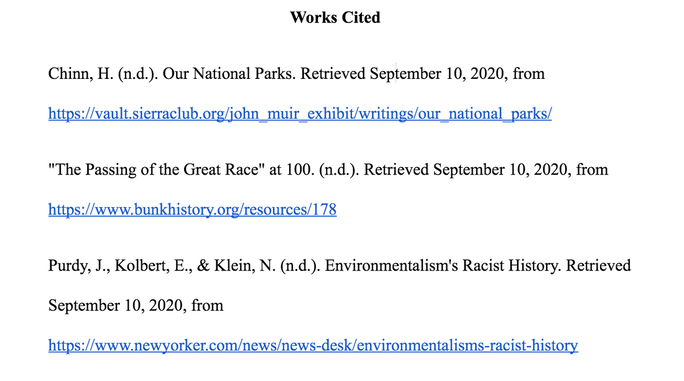|
September 26, 2020 / Source: The Bizz USA By Elizabeth Insuasti; Edited by Adya Kumar and Haarika Kalahasti Knowing and understanding the environmentalist movement's racist past is vital in cultivating and adapting to the present movement. At first glance, the fight for environmental reform and against climate change seems like the one problem everyone involved can support, regardless of race, because environmental issues affect everyone in an area. Based on Jedediah Purdy’s article, “Environmentalism’s Racist History,” this could not be further from the truth. Both in the past and present, environmentalism has been known to be a fight for the preservation of nature. The issue lies in the fact that varying groups of people tend to define nature differently. Many people form their definitions of nature and identify the country's environmental issues on what they see in their towns, neighborhoods, and cities. However, the causes and solutions to environmental issues are fundamentally different in the suburban and urban locations. Furthermore, the current responses to ecological problems are evasive to the social reforms demanded by minority groups. The majority of ecologists of color support the mainstream movement's goals, but they believe that social justice is consistently ignored. In discussing disproportionately located waste facilities, Purdy observes: "In 1987, the United Church of Christ's Commission for Racial Justice published an influential report that found that hazardous waste facilities were disproportionately located in minority communities, and called this unequal vulnerability 'a form of racism.' The report observed that the environmental movement 'has historically been white middle and upper-class'" (Purdy). While today's fight is for environmental justice, during the times of Madison Grant and Teddy Roosevelt, the environmental movement was an elite, white one. According to Purdy’s article, Madison Grant belonged to a bloodline and money defined Manhattan aristocracy. He is known for being a “credible wildlife zoologist” and helping create the Bronx Zoo. Grant also founded the first organizations dedicated to preserving wildlife, namely the American Bison and the California redwoods (Purdy). Grant and Teddy Roosevelt were both influential conservationists who worked hard to establish the country’s national parks and other public lands. Unfortunately, his conservationist works are not the only thing Grant is remembered for. He wrote “The Passing of the Great Race" in 1916. In this work, Grant expounds on his racial hypothesis that Alpine and Mediteranean people were the cause of a decline in the respectable "Nordic" people groups (Hartman, 2016). According to Purdy, Grant’s work influenced the Immigration Act of 1924. This act banned and directly affected those from the Middle East and Asia. On top of that, it also restricted immigration from Eastern Europe, Southern Europe, and Africa. Adolf Hitler, the infamous German dictator, even called the book his “ Bible.” Grant’s fellow conservationists supported his racist activism. Roosevelt praised the book calling it “a capital book” with “the facts our people most need to realize”(Purdy). Another well-known conservationist, John Muir, founder of the Sierra Club, had racist beliefs as well. In his “Our National Parks,” a 1901 essay collection written to promote parks tourism, he called the "Sambos" Indians of the Upper Midwest lazy and a dead civilization (Muir, 1901), Within just a few lines, Muir focused on human mistreatment toward bears--“Poor fellows, they have been poisoned, trapped, and shot at until they have lost confidence in brother man” (Purdy). Although these examples of prejudice could be put off as “common” of the time period, it is actually revealing of the society. These opinions and beliefs are not excusable because it was the popular opinion at the time. In 1972, the Sierra Club surveyed its members on whether the club should “concern itself with the conservation problems of such special groups as the urban poor and ethnic minorities.” The results showed more than forty percent opposed, and only fifteen percent supportive (Purdy). The executive director of the Environmental Defense Fund, Diane Regas, even stated, “Environmental groups have done a miserable job of reaching out to minorities” (Purdy). Although many ecological organizations of the past, such as the Sierra Club, have come to admit their racist origins and prior beliefs, the environmentalist movement's past actions still hinder and create obstacles for today's minority environmentalists to join the movement. Even though the movement has not always been supportive or concerned with projecting the voices of minority populations, it is currently making strides toward a more inclusive initiative.
0 Comments
Leave a Reply. |
Our WritersHaarika Kalahasti Archives
September 2021
Categories |



 RSS Feed
RSS Feed